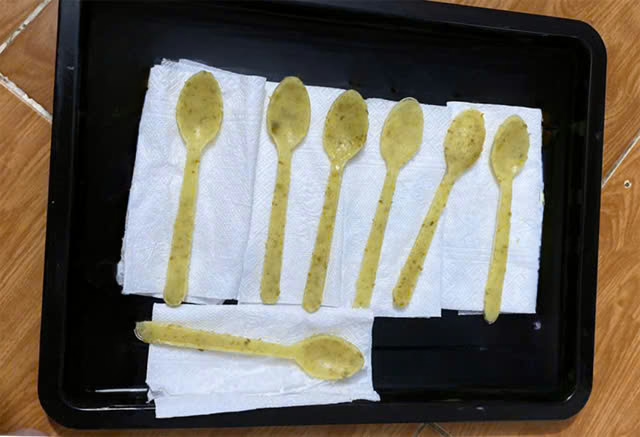From kumquat peels, a group of students have created spoons that are safe for users’ health and help reduce environmental pollution.
The owners of these bioplastic spoons made from kumquat peels are a group of students from FPT University including: Nguyen Mai Vinh, Duong Nguyen Tuyet Trinh, Tran Thi Bich Tram, Duong Thi Thao Nhu and Vo Phuoc Huy.
Mai Vinh, the group’s representative, said that currently, untreated single-use plastic products have left huge consequences for the environment and also affect the health of users due to the absorption of microplastic particles. The group also found that kumquat peels are quite abundant in the locality but have not been utilized. Therefore, the students came up with the idea of researching and creating bioplastic particles from kumquat peels. This product will ensure the health and safety of users and contribute to environmental protection.
 The team of authors will continue to develop bioplastic spoon products to bring to market
The team of authors will continue to develop bioplastic spoon products to bring to market
The process of creating a bioplastic spoon from kumquat peel is quite complicated because it is necessary to ensure the ratio of cellulose (a type of insoluble fiber that forms the framework for plant cells) of the kumquat peel throughout the production process. “First, we pre-process the kumquat peel, then dry it, mix it with glyceron plasticizer and some other ingredients,” Vinh shared.
“The group has an abundant supply of raw materials from the local agricultural market, so if the product is brought to market, the price will only be about 30% higher than disposable plastic products. If the group finds a business to cooperate in mass production, the price may be reduced further,” Vinh said.
Talking about the outstanding advantages of bioplastic spoons, Mai Vinh said: “First, the product can ensure the safety of users’ health because it does not use toxic chemicals. Made from natural ingredients, when the product comes into contact with hot foods it will not produce any harmful substances.
 Bioplastic spoon products made from kumquat peel
Bioplastic spoon products made from kumquat peel
The group representative also said that the bioplastic spoon is completely environmentally friendly and can decompose 100% in about 3 months. “The product also contributes to the implementation of the United Nations’ sustainable development goals. Specifically, goal number 8 (Ensuring sustainable economic growth), 12 (Ensuring sustainable production and consumption), 13 (Responding promptly and effectively to climate change and natural disasters)”, Vinh added.
In the future, Vinh said that the group will continue to develop to perfect the product and register intellectual property, and at the same time commercialize the product. Not only stopping at making bioplastic spoons, the group will take advantage of this material to make other products such as bowls, forks, plates, etc.
Dr. Nguyen Trong Luan, Head of the Department of Entrepreneurship, FPT University – Can Tho, shared: “I highly appreciate this project. The students have been interested in researching local agricultural products, taking advantage of those raw materials to start businesses that bring economic value, especially contributing to solving environmental protection problems. With not only stopping at plastic spoons, but also the future of an entire ecosystem of items made from this new material, this is a very potential project.
According to Thanh Nien Newspaper



